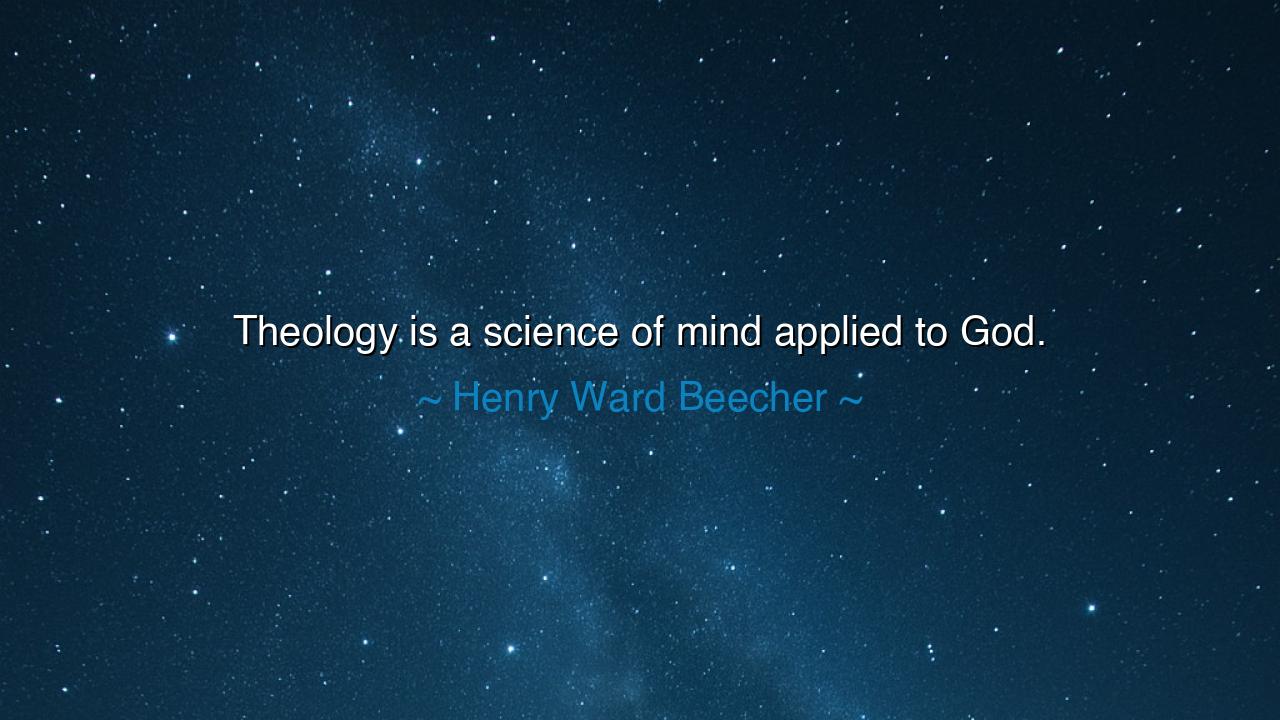
Theology is a science of mind applied to God.






Hear, O Seekers of Truth, the words of Henry Ward Beecher, who speaks of theology not as a simple doctrine, but as a science of the mind, a pursuit that attempts to understand God through the faculties of human reason. "Theology is a science of mind applied to God." In these words, Beecher offers a profound reflection on the nature of theology and its place in the human pursuit of understanding. He likens it to a science, a methodical inquiry into the divine, through the lens of human reason, thought, and experience. It is a discipline that seeks to understand the nature of God not through blind faith or mystical revelation alone, but through reflection, analysis, and the intellectual application of the mind.
In the ancient world, the great philosophers were often driven by a similar desire: to understand the nature of the divine and its relationship to the human condition. Plato famously wrote about the nature of reality and the ideal forms, seeing the physical world as a mere reflection of a higher truth. Aristotle, his student, sought to understand the first causes of all things, aiming to grasp the underlying principles of both nature and spirit. Their philosophy was a methodical approach to understanding the cosmos—both material and spiritual—using the faculties of the mind to grasp what could not be seen or touched. In the same way, Beecher sees theology as an intellectual pursuit, a science of the mind applied to God and the divine. It is through this methodical inquiry that we come closer to understanding the ultimate truth of the universe.
But what does it mean, O Seekers, to treat theology as a science of the mind? It is to approach the divine not with mere superstition or blind faith, but with the same rigor and clarity that one might apply to the study of any great discipline. Consider the work of St. Augustine, whose writings on God and faith have shaped much of Western thought. Though deeply spiritual, Augustine was also a keen intellectual, constantly seeking to reconcile his understanding of Christian doctrine with the rational philosophy of the ancient Greeks. His Confessions and City of God are not mere expressions of religious devotion, but are also works of profound intellectual inquiry—efforts to understand how the divine and the human could coexist. Like Beecher, Augustine saw that theology was more than just the study of sacred texts—it was a science that sought to grasp the divine through the lens of reason and the human mind.
The lesson here, O Seekers, is that theology, when approached as a science of the mind, is not about accepting dogma without question or blindly following tradition. Rather, it is a quest to understand the nature of God through reflection, reason, and inquiry. This approach allows us to question, to seek understanding, and to doubt in the pursuit of deeper truth. It encourages us not to shy away from hard questions or contradictions but to embrace them, for it is through this process of rigorous inquiry that we draw closer to understanding the divine. It is in this way that faith and reason are not opposed, but can work together, each enriching the other.
Consider the example of Thomas Aquinas, whose monumental work, Summa Theologica, sought to explain the mysteries of faith using the tools of reason. Aquinas, though deeply religious, was also a scholar and a philosopher. His theological writings combined Christian doctrine with the logical principles of Aristotle, creating a system of thought that was both rational and deeply spiritual. Aquinas showed us that theology does not have to be blind to reason, and that the mind can be applied to the divine, helping us to understand even the most profound mysteries of existence. This method of intellectual engagement with the divine laid the groundwork for much of modern theology and philosophy, just as Beecher’s thoughts continue to inspire a balance between faith and reason today.
The lesson, O Seekers, is that theology—like all great intellectual pursuits—must be more than a passive acceptance of doctrine. It is a living science, an ongoing inquiry into the nature of God and the divine, conducted with the tools of reason, analysis, and reflection. This approach allows us to grow in our understanding and to find peace in the knowledge that the mysteries of existence can be grasped through the mind, even as we continue to approach them with humility and faith. The human mind, when fully engaged, has the power to unlock the deepest secrets of the universe, and in doing so, it brings us closer to understanding our place in the grand cosmos.
So go forth, O Seekers, with the knowledge that theology is not just the study of holy texts, but a profound intellectual journey into the heart of the divine. Reason and faith are not opposites, but companions on the path to understanding. Seek to know God not only through revelation, but through the tools of the mind—through reason, reflection, and rational inquiry. Let this journey deepen your understanding of the divine, and let it lead you to greater peace and wisdom. May your quest for understanding be a quest for truth, for it is in the union of mind and spirit that the true essence of God is revealed.






AAdministratorAdministrator
Welcome, honored guests. Please leave a comment, we will respond soon